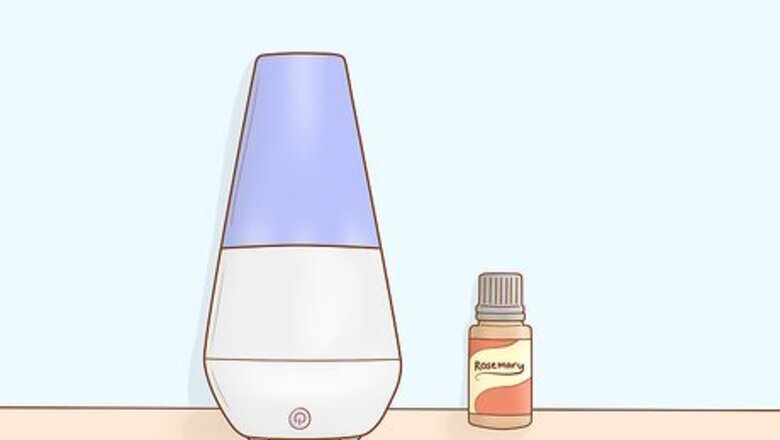
views
Diffusing Rosemary Oil
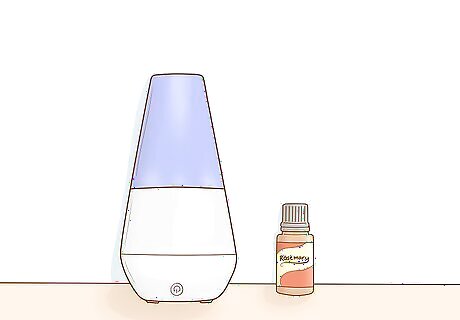
Use an essential oil diffuser to add the smell of rosemary to a room. Oil diffusers are often used to access physical, psychological, and cognitive effects that some essentials are thought to provide. For example, many people use diffusers with lavender oil as a sleep aid. Rosemary oil is thought to be mentally stimulating and may provide other positive effects. Most diffusers either require drops to be added to the machine or oil cartridges to be purchased from the manufacturer. Never use more than 8 drops of essential oil in a diffuser at one time—that's pretty overkill. Anywhere between 3 and 8 drops is a good range. Make sure you're cleaning out your diffuser after each use! Regular cleanings prevent any essential oil residue from building up.
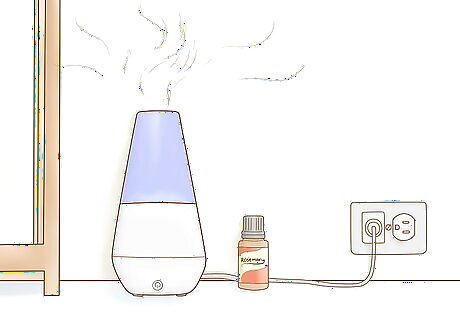
Diffuse rosemary oil to aid your awareness and working memory. If you have difficulty remembering small details or staying awake, there is evidence to support the use of rosemary essential oil as a memory aid. The smell of the oil helps cognitive functions, elevates mood, raises your heart rate, and may help you feel more refreshed. The chemistry in rosemary is proven to help with cognitive function. While it's power is well-documented, you should avoid relying on rosemary oil to heighten awareness or help memory. The essential oil has not been tested for long term use to improve nervous system function. Using it once in a while is a better approach.
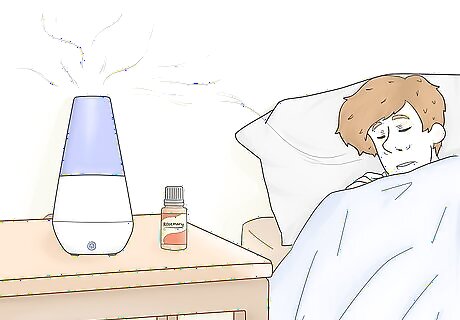
Let rosemary essential oil diffuse nearby to clear your sinuses. Rosemary essential oil is frequently used to help reduce chronic congestion and ease coughs. By letting your diffuser release rosemary oil into your living space, you may be able to relieve the pain of coughs and break up mucus in your sinuses.

Limit your use of diffusers and talk to your doctor if you have questions. Even if you're perfectly healthy, it's best to use diffusers a few times daily for no more than 30 minutes at a time. If you have chronic respiratory issues, you may want to avoid diffusers altogether. If you have other health issues, you should test a tiny amount of diluted rosemary oil on your skin. If in doubt, check with your doctor's office to see what they recommend. If you have pets in your home, you may want to look into the safety of rosemary oil for animals before using a diffuser.
Diluting Rosemary Oil for Topical Application
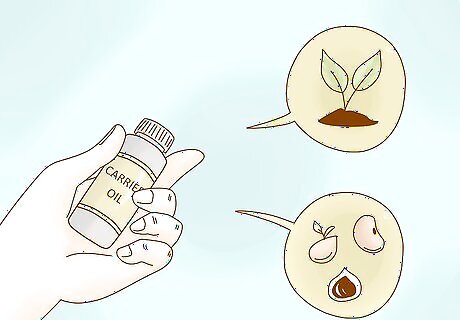
Choose a carrier oil to dilute rosemary oil. The oil should be a plant based, and made from seeds or nuts. You can check online for lists of carrier oils that are compatible with rosemary oil and purchase them online or at a local natural foods store. Almond and jojoba oil are both very common carrier oils that won't leave skin greasy, and will work to dilute rosemary oil. Never apply an undiluted essential oil to your skin unless a licensed aromatherapist expressly tells you to. Undiluted oils can significantly burn your skin.
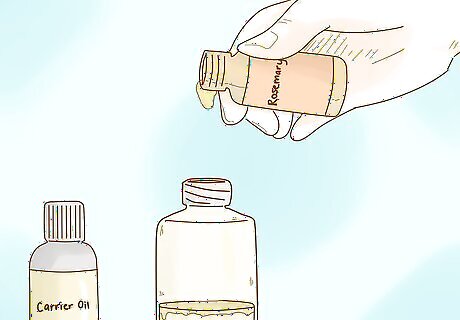
Add 9 to 18 drops of rosemary oil per 1 fluid ounce (30 mL) of carrier oil. This ratio will create a dilution of 1.5 to 3%, which is just right for topical application. You can create this mixture by combining the two oils in a small bottle. Children and those who are pregnant should use much heavier dilutions, using only 3 to 6 drops per ounce. Label the bottle as rosemary oil, plus the name of the carrier oil you used. A 2% dilution is great for massage oils.
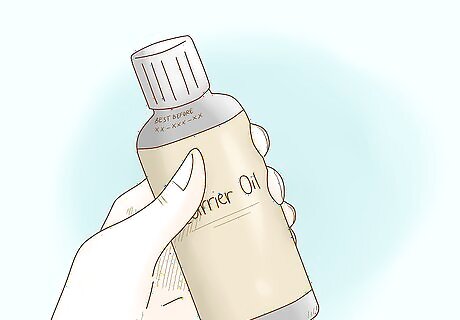
Be aware that the carrier oil may go rancid if kept too long. You should always check the expiration date on a bottle of carrier oil and note that information on a diffused bottle. If the carrier goes bad, the entire dilution should be disposed of. You can check for rancid carrier oil by smelling for a harsh, bitter odor, rather than the sweetness or odorless-ness of a fresh solution.

Avoid putting undiluted rosemary oil directly on your skin. The essential oil is far too potent to use on your skin without a carrier oil to dilute it. This is particularly true if you have sensitive skin, are nursing or pregnant, or have a compromised immune system.
Applying Rosemary Oil Topically
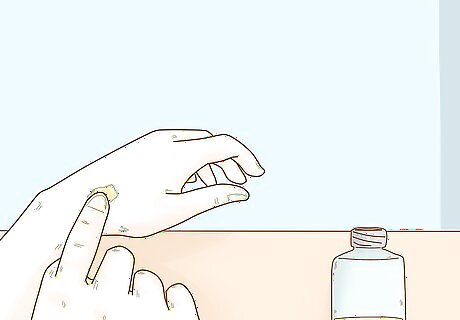
Test diluted rosemary oil on a patch of skin before applying it. Some people may have a reaction to rosemary oil, so it is always a good idea to apply a drop or two of the dilution to a patch of skin that is out of sight and allow it to sit for 12 to 24 hours to ensure there is no reaction. If you're skin gets red, itchy, or bumpy, discontinue using rosemary oil and consider talking to your doctor about it.
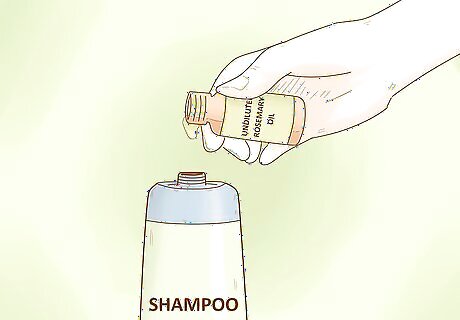
Add a few drops of undiluted rosemary oil to shampoo to encourage hair growth. While rosemary oil cannot completely reverse balding, it can help increase the amount of hair you grow. You can simply dilute a few drops of oil in your usual hair care products in the shower, or use a carrier oil to apply it safely to your scalp. A 1-2% dilution of rosemary oil is good for this. Massage it into your scalp every day to help encourage hair growth. Using rosemary oil for at least 6 months can cause hair growth in cases of androgenetic alopecia, or “male pattern baldness”, indicating the power of this essential oil to help with overall hair health. The oil may also improve your scalp's circulation.

Rub diluted rosemary oil on aching joints and muscles. As a topical salve, rosemary is often used to relieve joint pain and skin inflammation. You should be cautious about using more than one or two drops, and never rub the oil in an open wound. You can also eat rosemary leaves to potentially relieve mild inflammation in your digestive system.

Add a few drops of rosemary oil to face or body cleanser to help reduce acne. The anti-inflammatory, antiseptic, and circulation-improving qualities of the oil can reduce redness and help to clear acne quickly. You can even add diluted rosemary oil to your daily skincare regimen for the possibility of clearer, brighter skin.
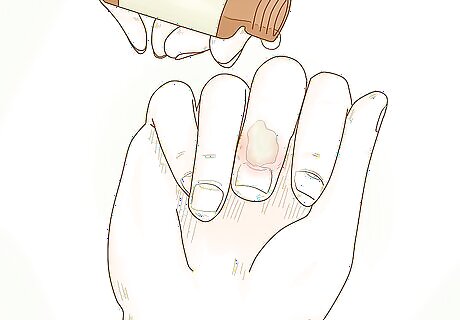
Apply a few drops of diluted rosemary oil to reduce infection. As with many essential oils, rosemary oil is a documented antiseptic that may reduce the severity of a skin infection. A small amount of rosemary oil can help kill off the bacteria that are causing your infection. You can also try rosemary oil for issues like dandruff, dermatitis, and nail bed infections. Avoid applying rosemary oil directly to an open wound.




















Comments
0 comment